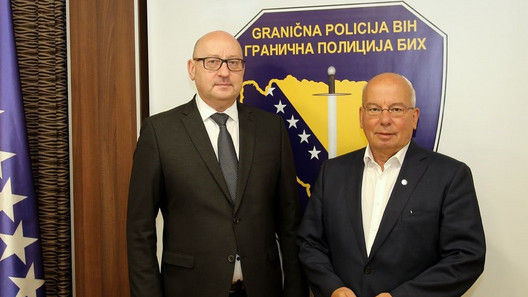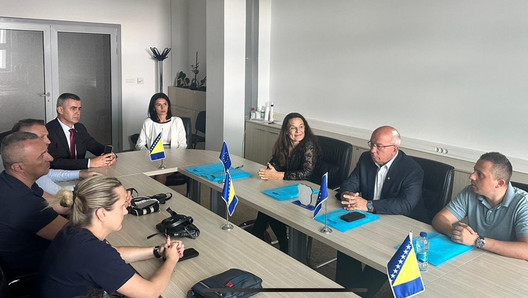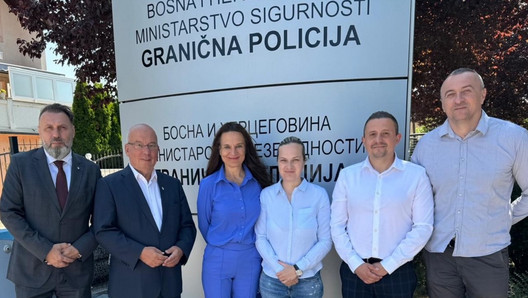A long road to EU membership
Visit to the police in Bosnia and Herzegovina - Wendt: ‘Developments must reach the workforce directly!’
EPU President Rainer Wendt visited the European Commission Representation in Bosnia and Herzegovina in the capital Sarajevo.
The organisers of the EPU delegation's visit, President Dragan Matovis and his deputy Emir Tanovis (Sindikat Granicne Policije of BIH), had prepared a whole host of programme items, and the meeting was correspondingly varied and busy. In addition to the various police authorities across the country, EPU President Rainer Wendt and Executive Assistant Jaqueline Hirt visited the European Commission Representation in Bosnia and Herzegovina in the capital Sarajevo. There they had a detailed discussion with the Head of the Rule of Law Department at the EU Representation in Bosnia and Herzegovina, Mr Alfredo Strippoli.
Bosnia and Herzegovina is one of the countries that have already been recognised as candidates for admission to the European Union, along with Albania, Georgia, Moldova, Montenegro, North Macedonia, Ukraine, Turkey and Serbia. The political situation is not uncomplicated, so the road to the European Union may still be a long one. Police officers there work under difficult conditions and face major challenges. The tasks of managing the migration of large numbers of people in particular were also repeatedly emphasised in the many discussions.
Contractual agreements between the trade unions and the government have still not been concluded and the government is finding it difficult to engage in dialogue. The salaries of the various units are correspondingly inadequate, especially in the border police authority. Health checks, cover for accidents and illnesses, working materials and conditions and a lack of personnel - the list of deficits is long, as are the inadequate legal provisions in the Police Act, which are urgently needed for legally compliant police action. ‘The government refuses to engage in social dialogue’ was one of the grievances most frequently voiced by the various trade union representatives.
The management of the various state authorities and their directors showed great willingness to engage in dialogue. This was demonstrated in intensive discussions with the Director of the State Investigation and Protection Agency (SIPA), Darko, the Director for Coordination of Police Authorities, Karic Enes, and the Director of the Border Police, Mirko Kupresakovic. The good contacts with Germany and the Federal Police were emphasised in all the talks. The director of the border police authorities emphasised the great commitment of the border guards and their success in combating smuggling and illegal migration.
The EPU delegation wanted to know exactly what was going on and set off on the hour-long journey to the Hum-Szepan Polje border crossing on the border with Montenegro to see the work of their colleagues on the ground. Rainer Wendt: ‘It's easy to summarise: the working conditions are dangerous, unhealthy and undignified. This is no way for a government to treat its own employees!’ The EPU announced that it would inform those responsible in the European Parliament, the Commission and the Ministry in Bosnia and Herzegovina in a detailed documentation of the conditions on site and press for remedial action.
EPU President Rainer Wendt continued: ‘Political processes, such as membership of the European Union, sometimes take many years, that is in the nature of things. But changes to the conditions under which our colleagues have to work do not take years, something must be done immediately! The government in Bosnia-Herzegovina can be pleased that the forces are still highly motivated and committed to their work, even though they are not held in high esteem by politicians. The minister's willingness to engage in dialogue must improve drastically; anyone who does not talk to the trade unions on the ground will also have little political success.’


